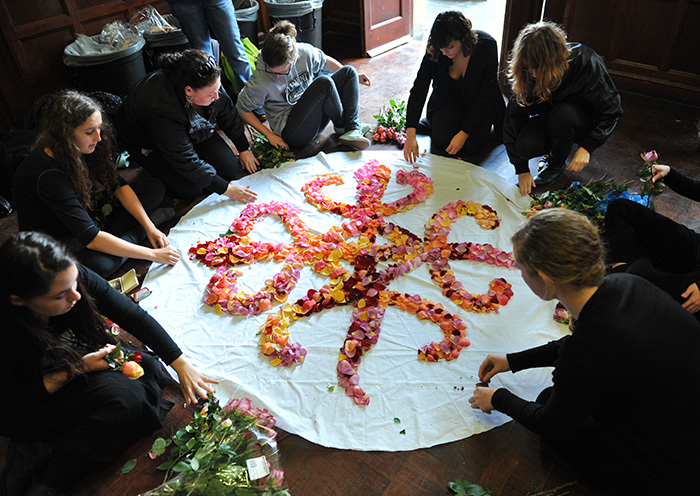HAICU and Michaelis in campaign against gender-based violence
28 August 2014 | Story by Newsroom
Passersby on UCT's upper campus might've noticed a trail of rose petals leading into the Molly Blackburn Hall on Thursday afternoon, 14 August 2014. These petals were part of a performance by first-year students from the Michaelis School of Fine Art, and part of an exhibition that HAICU, the university's HIV/AIDS, Inclusivity and Change Unit, has developed in collaboration with Michaelis lecturer Fabian Saptouw.
As part of their curriculum, students engage with social justice issues and are tasked with developing a communication campaign that will educate their peers about these issues. In this particular campaign, students were addressing the intersecting problems of gender-based violence and HIV/AIDS.
The 'walking exhibition' on upper campus was designed so that the larger UCT community could interact with artworks that looked at reframing problematic gender norms that place one at risk for HIV infection.
Julia Bidoli, one of the students involved in the rose petal performance, explained: "The rose is a symbol of beauty and particularly feminine beauty, and the act of rape is evil and hurts women. Tearing them apart symbolises the act of rape."
While the act of tearing the petals showed a deconstruction, the act of reconfiguring them into the Ghanaian symbol of unity showed how resilience and reframing is critical to addressing the issues of gender-based violence.
Fabian Saptouw, lecturer at the Michaelis School of Fine Art, weaves this collaboration into the curriculum, and was impressed with the innovative ways his students expressed their thoughts on the topic.
Disrespectful comments and lyrics
One group asked members of the UCT community to write down their reactions to inappropriate or disrespectful comments (as well as the comments themselves) on sticky notes, and the notes were pasted on the windows of the Molly Blackburn Hall.
Another group printed lyrics from popular songs and pasted the lines on a series of small hand mirrors.
"Many songs are about pain, heartbreak, and even abuse, but we don't always notice this because the real meaning can be downplayed with a backing track," say group members Caroline du Toit and Jasmine Valcarel. "We'd like to extract that backing track and have people think about the meaning of lyrics taken out of the context of the song and put into a more personal context. We want to do this by finding lyrics of popular songs that people can identify with because they have themselves heard the songs and sung along to them, but lyrics that indirectly hold notions of abuse.
"The point of the mirror is that the person reading the quote on the face of the mirror will at the same time be looking at their own reflection and so, in some sense, relate the quote to themselves and interpret it in a way that is relevant to their own experiences."
Local DJ Ryan O' Connor encouraged students to talk more openly about negotiating sexual practices in relationships, including female barrier methods. The HAICU-Michaelis campaign at UCT is also part of the international Global Female Condom Campaign to encourage the use of the female condoms as a means of prevention.
Story by Yusuf Omar. Image by Je'nine May.
 This work is licensed under a Creative Commons Attribution-NoDerivatives 4.0 International License.
This work is licensed under a Creative Commons Attribution-NoDerivatives 4.0 International License.
Please view the republishing articles page for more information.










